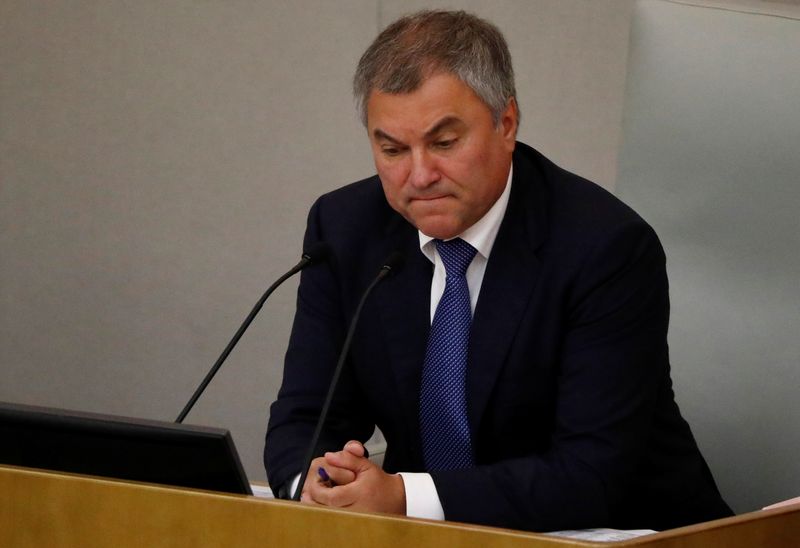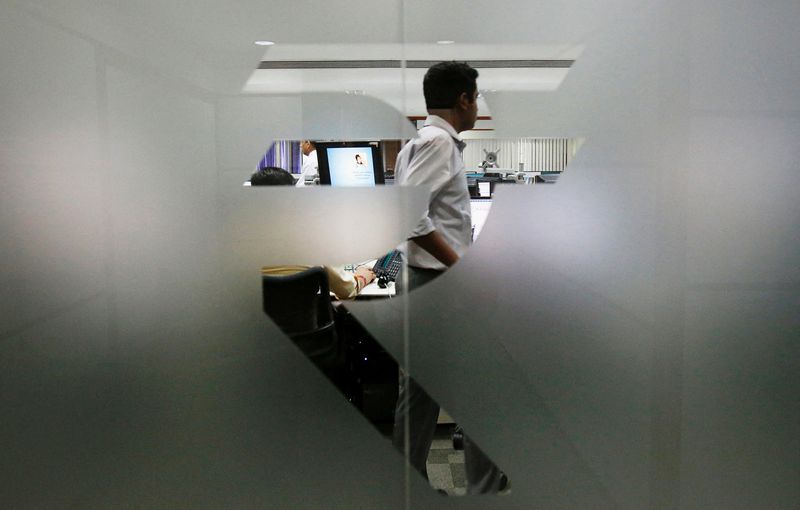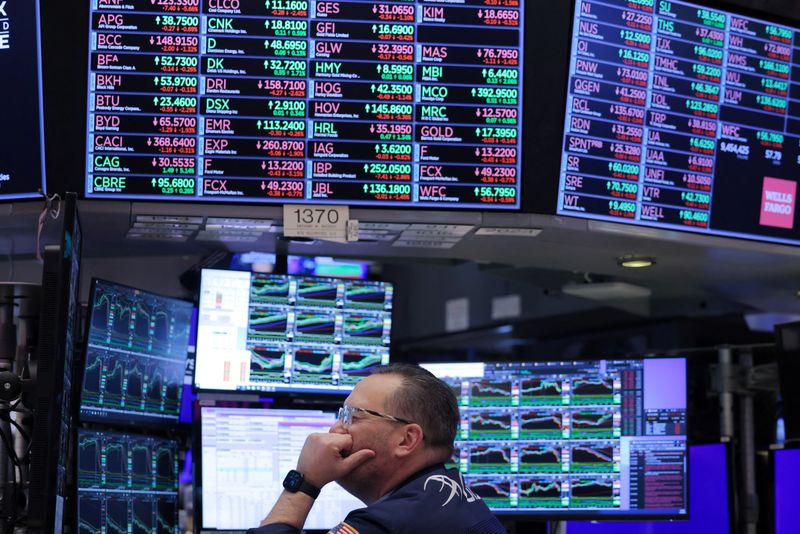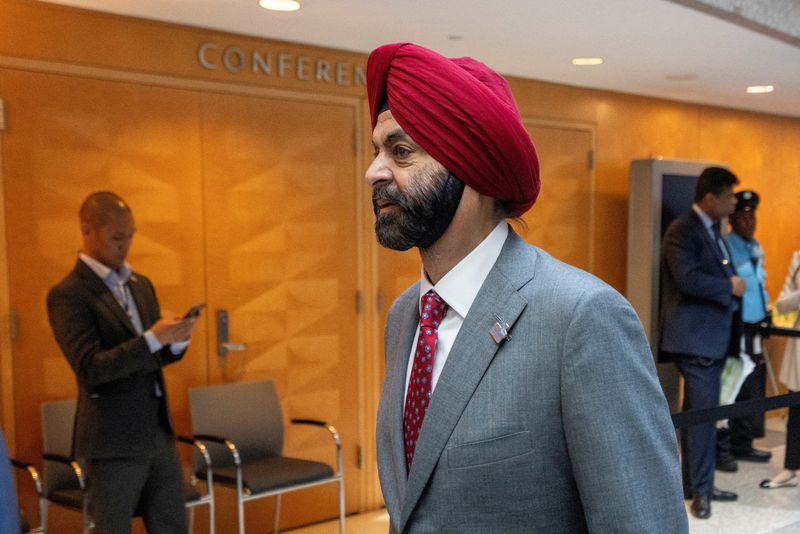Select Language

MOSCOW (Reuters) - Russia now has grounds to confiscate Western assets after the U.S. House of Representatives passed legislation that would allow the potential transfer of seized Russian assets to Ukraine, a top Russian lawmaker said on Monday.
"Washington has passed a law on the confiscation of Russian assets in order to provoke the EU to take the same step, which will be devastating for the European economy," Vyacheslav Volodin, the Duma speaker and close ally of President Vladimir Putin, said.
"Our country now has every reason to make symmetrical decisions in relation to foreign assets," said Volodin.
Volodin said that of the $280 billion of Russian assets frozen abroad, only $5 to $6 billion was in the United States while about 210 billion euros ($224 billion) was in the European Union.
NBC said the House passed the "REPO Act" which would allow the administration of U.S. President Joe Biden to confiscate billions of dollars’ worth of Russian assets sitting in U.S. banks and transfer them to Ukraine for reconstruction.
($1 = 0.9377 euros)

By Dharamraj Dhutia and Nimesh Vora
MUMBAI (Reuters) - India's rupee and government bonds will move this week based on developments in the Middle East crisis as well as a key U.S. inflation gauge that will impact the interest rate outlook.
The rupee dropped to a record low of 83.5750 to the U.S. dollar on Friday amid worries over a wider conflict in the Middle East and expectations that U.S. interest rates are likely to remain higher for longer.
The currency fell 0.1% in the week to end at 83.47, and the losses would have been larger had it not been for the Reserve Bank of India's (RBI) intervention.
The rupee should trade in a 83.25 to 83.75 range this week, traders said.
Emerging market currencies have come under pressure on concerns of a wider fallout of the Israel-Iran skirmishes.
"I would think that if there is more negative news on Middle East, RBI would be intervene heavily again based on how it has been in recent days," Kunal Kurani, associate vice president at Mecklai Financial, said.
The hawkish tone of Federal Reserve policymakers has prompted investors to dial back interest rate cut expectations.
U.S. core personal consumption expenditures price index, the Fed's preferred inflation measure, is due on Friday and will be watched for cues on the rates path ahead of a policy decision next week.
Meanwhile, the 10-year Indian government bond yield ended at 7.2278% on Friday, gaining 5 basis points in the week, after rising 11 bps in two previous weeks.
Traders expect the benchmark bond yield to move in a 7.16%-7.27% range this week.
Bond yields have been on an uptrend, tracking upward trajectory in U.S. yields as well as oil prices.
Treasury yields have risen as markets are now expecting fewer than 50 basis points of rate cuts in 2024.
Still, the recent rise in Indian bond yields has investors scouting for value as yields are seen easing later this year despite the local central bank holding rates, treasury officials have said.
"The benchmark bond yield may not rise much above 7.23%-7.25% levels," VRC Reddy, treasury head at Karur Vysya Bank said.
DBS Bank expects the benchmark yield to slip below 7% in July-December. As Indian government bonds have "low beta" to global bond movements, it is a good diversification trade for international debt market investors, the bank said.
KEY EVENTS: ** U.S. April S&P Global manufacturing, services and composite PMI - April 23, Tuesday (7:15 p.m. IST)
** U.S. March new home sales - April 23, Tuesday (7:30 p.m. IST) ** U.S. March durable goods - April 24, Wednesday (6:00 p.m. IST)
** U.S. initial weekly jobless claims week to April 15 - April 25, Thursday (6:00 p.m. IST)
** U.S. January-March advance GDP - April 25, Thursday (6:00 p.m. IST) (Reuters poll 2.1%) ** U.S. March personal consumption expenditure, core PCE index - April 26, Friday (6:00 p.m. IST)
** U.S. April U Mich sentiment - April 26, Friday (7:30 p.m. IST)

LONDON(Reuters) - Prices of homes being sold in Britain are close to their record highs after the biggest annual increase in a year, according to an industry survey that suggested the momentum in the housing market of early 2024 extended into April.
Property website Rightmove (OTC:RTMVY) said on Monday its asking prices for residential properties rose by 1.7% in the four weeks to April 13 when compared with the same period last year.
Prices sought by sellers rose by 1.1% in month-on-month terms, slowing from a 1.5% increase in the previous four weeks.
The average new seller asking prices of 372,324 pounds ($463,320) was only 570 pounds of a record hit in May 2023, Rightmove said.
Other measures of Britain's housing market have also shown a recovery in demand and prices, helped by a fall in borrowing costs which surged in 2022 when former Prime Minister Liz Truss's plans for sweeping tax cuts upset financial markets.
Rightmove said the number of new sellers was 12% higher than a year earlier and the number of sales was up by 13%. Demand was strongest in the high-end segment where asking prices in 2024 so far are up by the most since 2014.
Demand for properties typically sought by first- and second-time buyers - who are typically more mortgage-dependent rose by less, the survey showed.
"Despite the current optimism, these are not the conditions to support substantial price growth," Tim Bannister, Rightmove's director of property science, said.
"Sellers who are keen to secure their sale will still need to price realistically for their local market and avoid being over-ambitious."
($1 = 0.8036 pounds)

By Amy Lv and Tony Munroe
BEIJING/SINGAPORE (Reuters) -U.S. President Joe Biden's push to triple tariffs on Chinese steel imports strikes a mostly symbolic blow on an industry facing bigger concerns over faltering local demand and threats of even stronger blowback against China's surging exports.
Steel consumption in the world's second-largest economy is poised to shrink again this year as a protracted property crisis has yet to find bottom and as infrastructure demand growth slows after 12 indebted regions were ordered to halt certain projects.
The state-backed China Metallurgical Industry Planning and Research Institute (MPI) forecasts a 1.7% drop in China's steel demand this year, following a 3.3% decline in 2023.
While China's steel exports last year climbed more than a third to their highest since 2016 at 90.26 million metric tons, about 9% of its total crude steel output, just 598,000 tons of the shipments went to the United States. That was down 8.2% from volumes shipped to the U.S. the previous year and less than 1% of total Chinese steel exports worth $85 billion in 2023.
China, the world's biggest producer and exporter of steel, is just the seventh-largest shipper of steel to the U.S., softening the blow of Biden's proposal to raise to 25% the tariffs imposed by his predecessor Donald Trump on certain steel and aluminium products.
"We do not think there will be any big impact as the main destinations for China's steel exports are Japan, South Korea, and Middle East countries," said an analyst at a China-based steel trader who declined to be named as he was not authorised to speak with media.
Spurred by low local prices, Chinese steelmakers and traders are on track to match or surpass last year's exports, with domestic information provider Lange Steel lifting its forecast to more than 100 million tons for 2024 after March shipments beat expectations.
China's cheap steel products are also stoking complaints from beyond the United States.
Late last year, India imposed anti-dumping duties on some Chinese steel imports while Mexico announced a nearly 80% tariff. Thailand has launched a probe into Chinese rolled steel imports, and Brazilian steelmakers are urging their government to impose a 25% tariff on imports.
A report from a Chinese state-backed research agency identified a total of 112 statements from countries regarding anti-dumping and anti-subsidy moves on Chinese steel products in 2023, a rise of around 20 from 2022.
"We are expecting more trade frictions this year," said David Cachot, research director at consultancy Wood Mackenzie.
DOMESTIC DOLDRUMS
Beijing's latest support for the sector, a plan to back equipment upgrades in the industrial and farm sectors and speed consumers' replacement of cars and home appliances, is unlikely to fully offset reduced steel consumption from the property sector.
Consultancy CRU Group forecast that an additional 8 million to 9 million tons of steel demand will be created over the next four years thanks to the policy. In comparison, the state metallurgical institute expects construction demand to decline 20 million tons, or 4%, this year.
Some analysts said they expect infrastructure-led steel consumption this year to grow just 1% to 2%, from previous expectations of 7% to 8%, after Beijing's demand that a dozen regional governments delay or halt some state-funded infrastructure projects prompted other regions to follow suit.
In recent years, Beijing has imposed caps on steel production both to reduce supply and curb carbon emissions, and industry watchers and insiders say further output cuts are needed to curtail overcapacity.
"The steel industry faces a conspicuous contradiction -strong supply capability and dwindling demand," Luo Tiejun, vice chairman of state-backed China Iron and Steel Association (CISA), told an industry event this week in southern China.
"The key to address this is that leading producers take the lead in reining in production pace based on demand," Luo said, according to the group's WeChat account.
EXPORTS TO THE RESCUE?
In March, Chinese steel exports climbed to 9.89 million tons, the highest for a month since July 2016, bringing the first-quarter total to 25.8 millions even as overall exports in the world's second-largest economy contracted sharply.
Valued at $20.3 billion, China's first quarter steel exports averaged $789 per ton, far above local prices averaging 4,145 yuan ($572.30), data from customs and consultancy Mysteel show.
A weaker-for-longer yuan against the U.S. dollar, partly due to delayed U.S. Federal Reserve interest rate cuts, is also expected to facilitate steel exports.
But exports are susceptible to uncertainty stemming not only from trade frictions but also growing overseas supply and the potential for Beijing to mandate output limits.
To be sure, global steel demand is expected to rise 1.7% to 1.793 billion tons this year, the World Steel Association said.
"Although some countries are building their own capacity to fulfil the increase in local demand, this cannot meet the demand quickly enough, which means that there is still room for steel from China," said Kevin Bai, a Beijing-based analyst at CRU Group.
($1 = 7.2426 yuan)

Investing.com -- Earnings from the big tech names and another round of inflation data are due in the coming week, as a rally in U.S. stocks appears to be running out of steam partially due to worries that interest rates are likely to remain higher for longer. Here’s what you need to know to start your week.
U.S. inflation figures
Investors also get another look at U.S. inflation data on Friday with the personal consumption expenditures (PCE) price index, the Federal Reserve’s favoured inflation gauge, which economists expect to remain elevated in March.
Recent data indicating that progress on taming inflation has stalled, along with strong labor market data, geopolitical tensions in the Middle East that have sparked a rise in oil prices, and comments from Fed officials including Chair Jerome Powell have prompted investors to dial back expectations on the timing of any rate cuts.
Other economic data for the week includes an initial estimate of first quarter GDP, which is expected to have moderated slightly from the previous quarter. Data on new home sales and initial jobless claims will also be released along with revised figures on consumer sentiment and inflation expectations.
Big tech earnings
Big tech earnings are due are due to start arriving in the coming days after a week which saw the S&P 500 and the Dow Jones Industrial Average register their largest weekly percentage losses since March 2023, and the Nasdaq post its largest weekly drop since November 2022.
While first-quarter reporting season is still in its early stages, expectations have dimmed. Analysts now see aggregate S&P 500 earnings growth of 2.9% year-on-year, down from the 5.1% estimate on April 1, according to LSEG data cited by Reuters.
Four of the so-called Magnificent Seven group of tech giants will report - electric vehicle maker Tesla (NASDAQ:TSLA) on Tuesday after the market closes, Facebook-parent Meta (NASDAQ:META) on Wednesday, followed by Microsoft (NASDAQ:MSFT) and Google-parent Alphabet (NASDAQ:GOOGL) on Thursday.
Big tech is crucial to the S&P 500 as these companies hold the largest weightings in the index.
Oil prices
Oil settled slightly higher on Friday, but posted a weekly decline, after Iran downplayed Israel's retaliatory drone strike on its soil, indicating that an escalation of hostilities in the Middle East might be avoided.
As oil's risk premium gradually unwound, prices fell around 3% last week. Both benchmarks posted their biggest weekly loss since February.
Investors, however, are not ruling out the possibility that Middle Eastern tensions will disrupt supply.
Meanwhile, reports Friday said the International Monetary Fund expects OPEC+ to begin increasing oil output from July.
OPEC+ members, led by Saudi Arabia and Russia, last month agreed to extend voluntary output cuts of 2.2 million barrels per day (bpd) until the end of June. That has helped keep oil prices elevated.
PMI data
Investors will be closely watching PMI data out of the Eurozone the U.S. and the UK on Tuesday for any signs that inflation, especially in the services sector, is returning.
The March U.S. PMI showed U.S. services industry growth slowed further last month, along with services inflation.
The PMI figures could also indicate that the Eurozone economy is rebounding after March PMI data showed activity stabilizing and services inflation easing, keeping the European Central Bank on track for a widely expected June rate cut.
BOJ meeting
Investors will be on the look-out for clues on timing of the next rate hike when the BOJ releases fresh quarterly growth and inflation forecasts at its policy meeting on Friday.
BOJ Governor Kazuo Ueda said on Friday the central bank "very likely" will raise interest rates if underlying inflation continues to go up and begin reducing its huge bond buying at some point in the future.
The remarks reinforced expectations the central bank will raise its short-term interest rate target from the current 0-0.1% range sometime this year.
The yen has been declining since the BOJ's decision last month to end eight years of negative interest rates, as markets focused on its dovish guidance signalling that borrowing costs will be stuck around zero for some time.
(Reuters contributed to this report

By David Lawder
WASHINGTON (Reuters) - The World Bank Group on Thursday unveiled a new goal to help countries deliver affordable healthcare to 1.5 billion people by 2030 by expanding services to remote areas, cutting fees and other financial barriers and focusing on lifetime care.
The development lender said it would deploy financing, its own health expertise and new partnerships with private-sector firms, non-governmental organizations and civil society groups in reaching the target, which it defines as a person receiving treatment by a health care worker through an in-person visit or a telehealth appointment.
The World Bank estimates about 2 billion people around the world face severe financial hardship when paying for health services. This is being exacerbated by climate change, pandemics, conflicts, societal aging, and a projected shortfall of 10 million healthcare workers by 2030, it said.
"Providing a basic standard of care for people throughout their lives is critical for development," World Bank President Ajay Banga said in a statement. "This ambition won't be realized with a solo effort. It will require partners, a coalition of public and private sector, working together to expand access to healthcare services."
The World Bank said financing from its International Development Association fund for the poorest countries will aim to bring healthcare workers into communities where people may otherwise have no access to services.
In middle-income countries, the World Bank said its International Bank for Reconstruction and Development will deploy financing to incentivize government investments in health and regulations that provide market certainty and can attract private-sector investment, including in pharmaceuticals and medical equipment.
The World Bank added that Japan is launching a knowledge hub on its universal healthcare system aimed at enhancing other healthcare ministries' capacity and expertise, an initiative supported by the World Bank and the World Health Organization.

By Ann Saphir and Michael S. Derby
(Reuters) -Federal Reserve policymakers have coalesced around the idea of keeping borrowing costs where they are until perhaps well into the year, given slow and bumpy progress on inflation, and a still-strong U.S. economy.
On Thursday New York Fed President John Williams became the latest U.S. rate-setter to embrace the "no rush" on rate cuts view articulated in February by Fed Governor Christopher Waller and since echoed by many of his colleagues.
"I definitely don't feel urgency to cut interest rates" given the strength of the economy, Williams said at the Semafor's World Economy Summit in Washington. "I think eventually...interest rates will need to be lower at some point, but the timing of that is driven by the economy."
Cleveland Fed President Loretta Mester, in comments late on Wednesday, also said the Fed will likely cut rates "at some point," steering clear of the later "this year" language she - and Williams - had previously used.
Speaking in Fort Lauderdale, Florida on Thursday, Atlanta Fed President Raphael Bostic offered "the end of the year" as his view of the likely timing for a first rate cut, saying "I'm comfortable being patient."
Minneapolis Fed President Neel Kashkari told Fox News Channel he also wants to be "patient," with the first rate cut "potentially" not appropriate until next year.
As recently as a few weeks ago many policymakers signaled they expected hotter-than-expected inflation in early 2024 would give way to cooler readings in the face of the Fed's tight monetary policy, necessitating several rate cuts before the end of the year to prevent policy from slowing the economy too much.
But strong growth in jobs, a third-month-in-a-row upside surprise on inflation in March, and robust retail spending among other recent economic indicators have convinced more central bankers that rate cuts ought to wait.
Earlier this week Fed Vice Chair Philip Jefferson omitted any reference to the appropriate timing for rate cuts, and Fed Chair Jerome Powell said it's likely to take longer to get enough confidence on inflation's decline to reduce borrowing costs.
As San Francisco Fed President Mary Daly put it on Monday, "the worst thing to do is act urgently when urgency is not required."
With Fed rhetoric shifting and the labor market data showing few signs of cracks, financial markets have also moved to price in fewer and later rate cuts. Futures contracts that settle to the Fed's policy rate now reflect expectations that the first reduction comes in September, versus June just a few weeks ago. The odds of a second rate cut by the end of the year have dropped to about 50-50, based on the CME FedWatch Tool.
A Reuters poll released on Thursday showed economists are on the same page.
Inflation by the Fed's targeted measure, the personal consumption expenditures price index, was 2.5% in February, and Fed policymakers say they expect the March reading of core PCE - a gauge of where inflation is heading - to be even higher. The Fed targets 2% inflation.
That has even raised questions of whether the Fed may have to hike rates again to ensure price pressures ebb. Williams said that appears unlikely but noted that it was impossible to rule out.
Bostic, in an appearance in Miami late on Thursday, said that stalled progress on inflation, while not his expectation, would mean "I'd have to be open to increasing rates."
Fed policymakers next meet April 30-May 1 and are expected keep the policy rate in the 5.25%-5.5% range, where it has been since last July.

(Reuters) - Cryptocurrencies fell heavily and bitcoin broke below $60,000 on Friday in a rush out of risky assets following reports of an Israeli missile strike on Iran.
Bitcoin slid more than 5.5% to $59,961 in the Asia session as the U.S. dollar rose broadly. Ether fell by a similar margin, dropping below the $3,000 barrier to $2,895.
Israeli missiles hit a site in Iran, ABC News reported, citing a U.S. official, days after Iran launched a drone strike on Israel.
Iran's Fars news agency said an explosion was heard at the airport in the Iranian city of Isfahan.
Oil, gold and bonds rallied sharply.

By Rae Wee
SINGAPORE (Reuters) - The resurgent dollar headed towards a second straight week of gains on Friday as a hotter-than-expected U.S. economy has pushed back investors' and policymakers' expectations of the trajectory of Federal Reserve rate cuts this year.
The greenback's 0.17% gain for the week was somewhat capped by a slight stall in its rally since Thursday following a rare trilateral warning from finance chiefs in the United States, Japan and South Korea over the latter two's sliding currencies, raising the risk of a potential joint intervention.
That's as Asian currencies, in particular, come under immense pressure from the dollar's strength.
"It is symbolic that they made that joint statement," said Carol Kong, a currency strategist at Commonwealth Bank of Australia (OTC:CMWAY) (CBA).
"Given the recent developments, the prospect of a joint Asian FX intervention is definitely rising. I'm not sure about whether or not the U.S. will be involved in that intervention, because ultimately, a stronger U.S. dollar will just help the FOMC's inflation fight."
The yen was last little changed at 154.61 per dollar, languishing near a 34-year low and not far from the 155 level which traders see as a new line in the sand that would prompt an intervention from Tokyo.
The Japanese currency was eyeing a weekly loss of more than 0.8% and was down 2% for the month thus far, ahead of the Bank of Japan's (BOJ) monetary policy meeting next week.
BOJ Governor Kazuo Ueda said on Thursday the central bank may raise interest rates again if the yen's declines significantly push up inflation, highlighting the impact currency moves may have on the timing of the next policy shift.
Elsewhere, sterling fell 0.08% to $1.2427, leaving it on track to lose 0.18% for the week. The euro eased 0.06% to $1.0637 and was set to clock a marginal weekly loss.
While expectations of a first Fed rate cut have been pushed back to later this year, traders expect the European Central Bank to begin its rate easing cycle in June, which will likely keep the common currency weak for some time.
"Once the ECB starts cutting, it'll be apparent that global central banks will face divergent monetary policy easing cycles, and that will just exacerbate the strength in the dollar against the euro and other major currencies," said CBA's Kong.
Fed funds futures now show just about 40 basis points (bps)worth of cuts priced in for the U.S. central bank this year - a significant pullback from the 160 bps of easing expected at the start of the year.
The shift in rate expectations has come on the back of a slew of resilient U.S. economic data which has repeatedly surpassed expectations, alongside still-sticky inflationary pressures.
That's also resulted in Fed policymakers pushing back on bets for U.S. rate cuts beginning as early as June, and Chair Jerome Powell early this week similarly said monetary policy needs to be restrictive for longer.
"Although policy easing may arrive a bit later than previously expected, we still believe the FOMC will start cutting rates before the year is out," said economists at Wells Fargo. "We expect inflation to trend lower throughout the year, but progress will likely be gradual."
Against a basket of currencies, the greenback rose 0.05% to 106.22, hovering near a more than five-month high of 106.51.
The Australian dollar fell 0.15% to $0.6411 and eyed a weekly drop of more than 0.8%.
Data on Thursday showed domestic employment fell in March after an enormous gain the month before while the jobless rate resumed its uptrend, a sign that the relatively-tight labour market was still on track to loosen, albeit at a slower pace.
The New Zealand dollar edged down 0.1% to $0.5895, and was similarly on track to lose 0.7% for the week.

By Jamie McGeever
(Reuters) - A look at the day ahead in Asian markets.
Asian markets will hope to end a bruising week on a positive note on Friday, but fraying global sentiment and a reluctance to take on much risk ahead of the weekend amid persistent Middle East tensions could limit any upside.
Headlines from the great and the good of global finance gathered in Washington continue to keep traders on edge, especially regarding exchange rates and central banks' policy path relative to an increasingly hawkish Fed.
The world's biggest exercise in democracy gets underway on Friday too, as the first of seven phases opens in India's general election, with 166 million voters across 21 states and territories casting their vote.
Asia's economic calendar, meanwhile, sees the release of first quarter GDP from Malaysia and Japanese inflation for March. The latter could determine whether the dollar, currently around 154.50 yen, makes another push to break above 155.00.
Bank of Japan Governor Kazuo Ueda said on Thursday the central bank may raise interest rates again if the yen's declines significantly push up domestic inflation.
The IMF on Thursday urged Asian central banks to focus on domestic inflation and avoid tying their policy decisions too closely to anticipated moves by the U.S. Federal Reserve.
On Wednesday, the United States, Japan and South Korea issued a joint statement to "consult closely" on the yen and won's recent weakness against the dollar.
The greenback is firm, rallying 3% in the last few weeks to its highest since November.
U.S. bond yields are ticking higher again and will post their third weekly rise in a row, with the 2-year Treasury yield back up at 5%. The two- and 10-year yields are up 40-45 basis points in the last few weeks.
That's a tightening of financial conditions that emerging markets are struggling to handle. Asian stocks are eyeing their biggest weekly fall since January, with the MSCI Asia ex-Japan index down 2.3% this week and off 5% from its high last week.
Japan's Nikkei, which hit an all-time high above 41,000 points in late March, is off 7% since then and on Thursday hit a two-month low. A flat close or fall on Friday will seal its worst week since December 2022.
The Nasdaq and S&P 500, meanwhile, have fallen five days in a row, their worst runs since October and December 2022, respectively.
Figures on Thursday, meanwhile, could help soothe fears that the yuan's weakness will accelerate capital flight out of the country - foreign investors increased their holdings of China's onshore yuan bonds in March for a seventh straight month.
Here are key developments that could provide more direction to markets on Friday:
- Japan CPI inflation (March)
- Malaysia GDP (Q1)
- India general election opens
(By Jamie McGeever; Editing by Josie Kao)

